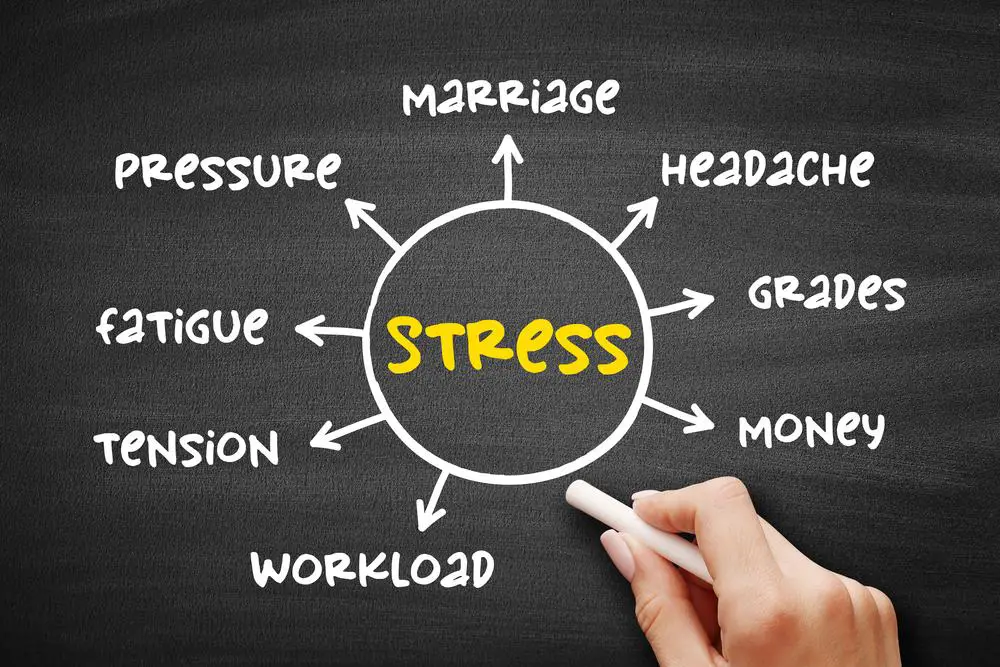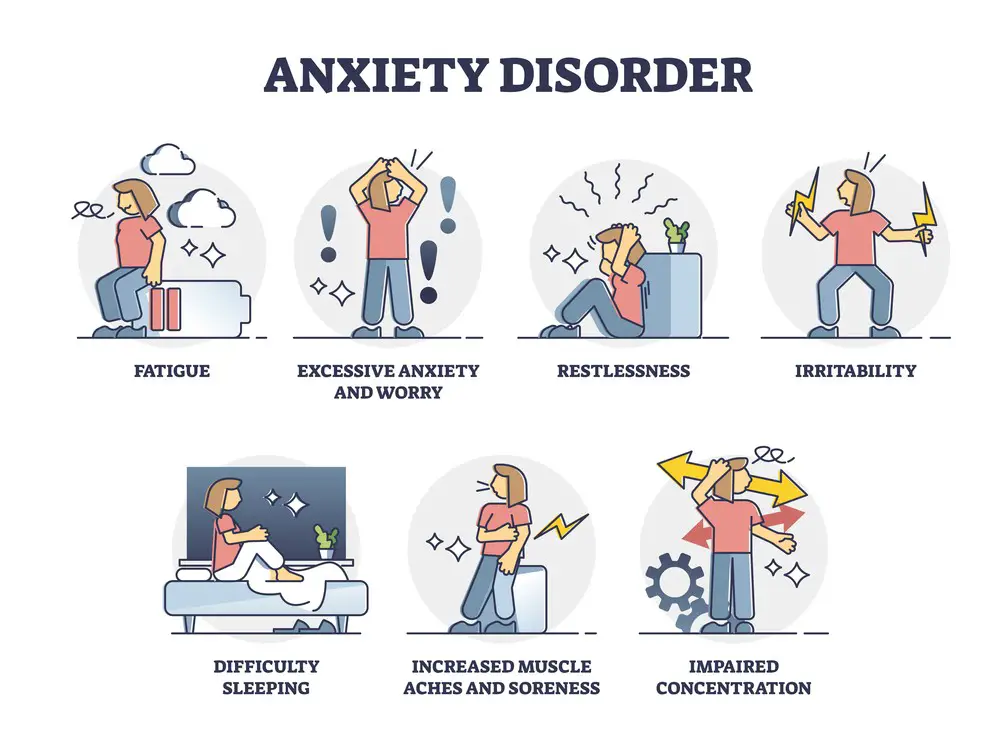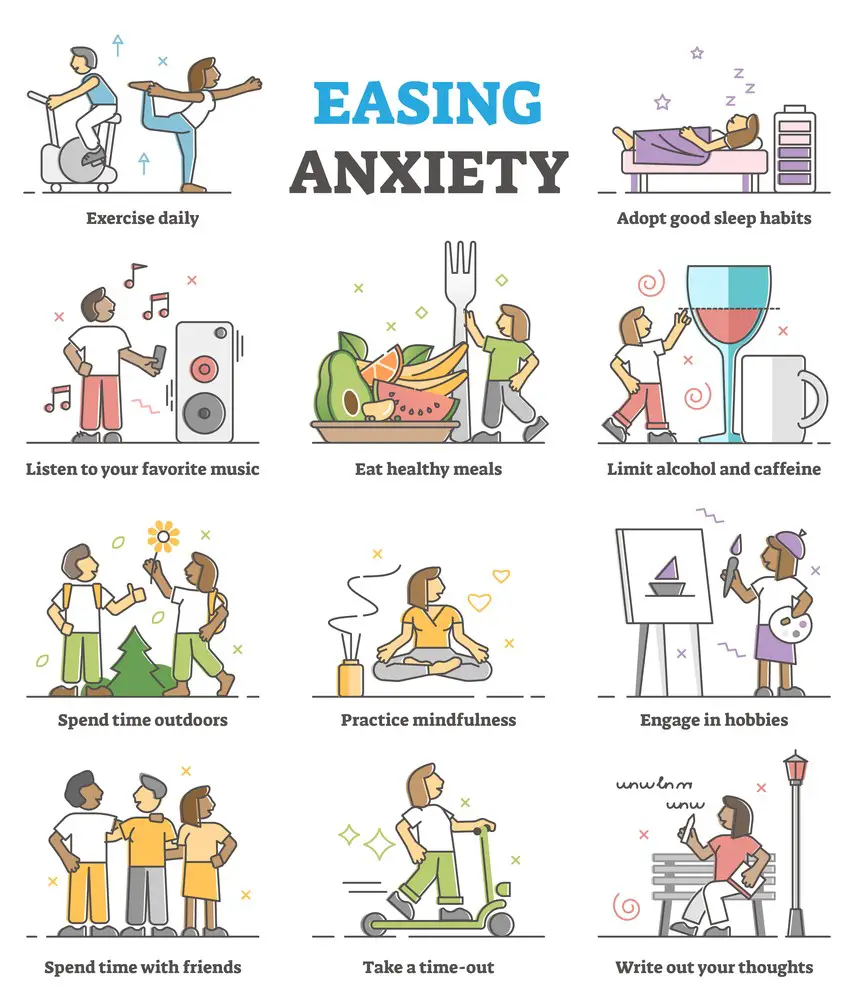You’re not alone if you’ve ever felt your back tighten during high stress. Anxiety is a leading cause of muscle tension and subsequent back pain. This article dives into the sensations associated with anxiety-induced backaches and offers strategies to manage them effectively.
Discover relief in understanding and addressing this condition. Let’s explore together.
Unraveling the Connection: Anxiety and Back Pain
Anxiety often triggers your body to tense up, leading to muscle strains that manifest as back pain. Understanding this link can help you effectively target your mental and physical discomfort.
How Stress Can Lead to Muscle Tension and Spasms In The Back
 Stress triggers your body’s “fight or flight” response, which tightens back muscles to prepare for perceived danger. This tension can persist, turning into chronic muscle tension and leading to spasms in the back.
Stress triggers your body’s “fight or flight” response, which tightens back muscles to prepare for perceived danger. This tension can persist, turning into chronic muscle tension and leading to spasms in the back.
These involuntary muscle contractions are not only painful but also contribute to a cycle of stress-induced back pain. Such conditions make emotional control difficult, especially when dealing with chronic pain.
Muscle groups in the back are particularly prone to tightening under stress. This increased tension can drastically enhance the likelihood of back pain. As anxiety greatly increases muscle tension throughout the body, it becomes a leading cause for concern in individuals experiencing both anxiety disorders and chronic back issues.
The relationship between psychological distress and physical sensations like stiffness or spasms illustrates how deeply interconnected our emotional and physical well-being are.
Lowered Sensitivity and Reactivity to Pain
Dealing with anxiety can change how you feel pain. Your body’s nervous system, constantly on high alert due to stress, might adjust, making you less sensitive to physical discomfort.
This doesn’t mean the pain is any less real or significant; rather, your perception of its intensity may be altered. Over time, chronic stress and anxiety can lead to this reduced sensitivity as a coping mechanism of sorts.
Your muscles, especially those in the back prone to tension during anxious periods, might not react the same way to pain signals as they would under normal conditions. This alteration in pain reactivity could complicate identifying and addressing back issues.
Understanding these nuances helps us grasp why managing emotions plays an essential role in dealing with anxiety-induced backache.
Understanding the Sensations: Anxiety-Induced Backache
Understanding the sensations of anxiety-induced backache helps in identifying and managing this physical manifestation of stress.
Dull or Sharp Ache
People experiencing anxiety-induced back pain often report a sensation that fluctuates between a dull ache and a sharp stab. This variety in sensations can signify the body’s response to increased muscle tension caused by stress and emotional discomfort.
As anxiety heightens, muscles in the back contract involuntarily, leading to an ache that might feel like a persistent throb or sudden sharp pains that grab your attention.
The level of pain can also reflect the intensity of one’s anxiety state. During moments of high stress or panic attacks, individuals might notice their back pain intensifying into sharper spikes.
Conversely, the pain may present as a constant dull ache during general anxiousness without acute panic. Understanding this connection highlights why managing anxiety is crucial for those seeking relief from chronic back pain and psychological distress.
Stiffness
Stiffness in your back can be a direct result of anxiety’s grip on the muscles there. Anxiety triggers an increase in muscle tension throughout the body, especially noticeable in the back area.
This heightened tension forces the muscles to contract more than normal, making them stiff and sore. The discomfort ranges from mild stiffness that disrupts certain movements to severe rigidity that affects daily activities.
Tackling this stiffness often involves addressing both the physical sensations and the underlying emotional distress causing them. Effective coping mechanisms include regular stretching exercises tailored specifically for the back, mindfulness practices to soothe nervous system reactivity, and seeking professional guidance to manage anxiety symptoms.
These strategies aim to relieve current stiffness and prevent its recurrence by dealing with stress-induced back pain directly at its roots.
Muscle Spasms
Muscle spasms are a common symptom of anxiety-induced back pain. Anxiety greatly increases muscle tension, particularly in the back, leading to involuntary contractions or spasms. These spasms can occur unpredictably and vary in severity, causing discomfort or sharp pain.
It’s not just the physical sensation; the experience can also feed into the cycle of stress and anxiety, making emotional control more difficult.
During these moments of heightened tension caused by stress or panic attacks, your back muscles may tighten suddenly and painfully. Understanding this connection helps identify muscle spasms as both a physical manifestation and a signal of underlying anxiety issues.
Addressing both the mental and physical aspects is crucial for relief.
Exploring the Physical Manifestations of Anxiety-Related Back Pain
 Anxiety triggers a significant increase in muscle tension, particularly around the back. This added tension leads to various sensations that can disrupt daily activities and overall well-being.
Anxiety triggers a significant increase in muscle tension, particularly around the back. This added tension leads to various sensations that can disrupt daily activities and overall well-being.
The back, home to numerous muscles known to tense up during moments of stress or anxiety, becomes a primary site for discomfort. Individuals often report feelings ranging from dull, persistent aches to sharp spasms with no physical catalyst other than their emotional state.
This type of pain underscores the complex interplay between our psychological state and physical health, illustrating how deeply interconnected they are.
The experience of back pain related to anxiety also includes symptoms such as stiffness near the neck, shoulder blades, and lower back areas. These manifestations signify the body’s response to stress and impact one’s ability to manage emotional control effectively.
As chronic back pain becomes more prevalent with ongoing anxiety, it establishes a cycle where pain feeds into stress and vice versa.
Acknowledging these symptoms is crucial for understanding the full scope of anxiety’s impact on the body and highlights the importance of addressing both psychological distress and its physical outcomes together.
Coping Strategies: Alleviating Anxiety-Driven Backache
Anxiety and stress can manifest physically in the form of muscle tension and back pain. This backache often feels dull, aching soreness in the lower back or between the shoulder blades. The pain may come and go or be persistent.
When anxious, the body goes into fight-or-flight mode, releasing stress hormones and tensing muscles. Coping strategies that relax both the mind and body can help alleviate this.
Exercise like yoga, Pilates, or gentle stretching helps loosen tense muscles. Meditation and deep breathing elicit the relaxation response, quieting the mind. Getting a therapeutic massage also relieves muscle tightness. Using heat pads or ice packs on the back reduces inflammation.
Staying well-hydrated, limiting caffeine, getting enough sleep, and ensuring proper ergonomics also take the pressure off the back. Implementing regular stress relief through these holistic coping methods can help mitigate anxiety and its physical manifestations.
Relaxing both body and mind is vital to overcoming anxiety-driven back pain.
Seeking Relief: Natural Remedies for Anxiety-Related Back Pain
 Anxiety back pain often feels like an ache or tension in the lower back and shoulders. The body tenses muscles when stressed, and tightness often concentrates in these areas. Seeking natural relief helps relax both mind and body to ease discomfort.
Anxiety back pain often feels like an ache or tension in the lower back and shoulders. The body tenses muscles when stressed, and tightness often concentrates in these areas. Seeking natural relief helps relax both mind and body to ease discomfort.
Massage therapy works out muscle knots and increases circulation. Acupuncture releases endorphins and calms the nervous system. Herbal supplements like chamomile, lavender, and passionflower provide gentle sedation.
When applied to the back for topical relief, Arnica, capsaicin creams, or CBD oils reduce inflammation. Heat pads can penetrate sore muscles, while ice packs numb pain. Guided meditations, deep breathing exercises, and yoga help quiet racing thoughts while safely stretching tense areas.
Sleeping, staying hydrated, and eating anti-inflammatory foods also remove strain. When anxiety manifests as back pain, holistic and home remedies allow the body to decompress naturally. Relaxing a tense mind simultaneously eases muscular tension. A multipronged, gentle approach works best for alleviating anxiety’s physical burdens.
Breaking the Cycle: How to Manage Anxiety to Reduce Back Pain
 Moving beyond natural remedies, it’s crucial to address the root cause of the problem by managing anxiety effectively to reduce back pain. Anxiety increases muscle tension throughout the body, particularly in areas like the back, which can lead to chronic discomfort and restrict emotional control.
Moving beyond natural remedies, it’s crucial to address the root cause of the problem by managing anxiety effectively to reduce back pain. Anxiety increases muscle tension throughout the body, particularly in areas like the back, which can lead to chronic discomfort and restrict emotional control.
Implementing strategies for emotional regulation and anxiety management becomes instrumental in breaking this cycle. Mind-body techniques such as mindfulness meditation, deep breathing exercises, and yoga can significantly lower stress levels, reducing muscle tension and alleviating back pain.
Engaging in regular physical activity is also vital in managing both anxiety and back pain. Exercise releases endorphins – chemicals in the brain that act as natural painkillers – enhancing your mood and physical health.
Establishing a consistent sleep schedule reduces anxiety and back pain by allowing the body adequate time to rest and repair itself. Combining these approaches not only addresses immediate symptoms but also works towards establishing long-term resilience against stress-induced back pain.
Preventing Anxiety-Induced Backache: Proactive Steps to Take
Anxiety back pain often feels like muscle tension, soreness, or dull aching between the shoulder blades or lower back. The body tenses under stress, with shoulder and lower back pain. To prevent anxiety and stress from compounding into physical pain, it helps to take proactive steps.
First, mental health practices like meditation, deep breathing, and guided visualization curb stress hormones and relax the body. Regular exercise such as yoga, Pilates, or gentle stretching also prevents muscles from tightening due to anxiety. Good posture and ergonomics take further pressure off the back by supporting it properly throughout the day. Getting regular massages helps treat early muscle knots before they become painful. Staying hydrated and limiting caffeine and alcohol intake additionally relieves strain.
Furthermore, proper sleep and nutrition give the body resources to cope with stress. 7-9 nightly hours of quality sleep renews energy, while anti-inflammatory foods reduce back pain triggers.
Finally, openly communicating feelings with trusted confidants provides emotional support. Keeping anxiety and stress managed through holistic means prevents the cascade into physical symptoms. Being proactive allows the body to stay relaxed amidst mental unease.
Holistic Approaches: Integrative Therapies for Anxiety and Back
Holistic approaches consider both mind and body, offering integrative therapies to tackle anxiety and back pain together. These methods include meditation, yoga, and acupuncture, designed to relieve stress and reduce physical discomfort.
Seeking Professional Help
 Consulting a healthcare professional is crucial if you’re experiencing anxiety-induced back pain that disrupts your daily life. Doctors and therapists can offer tailored treatments based on the unique combination of your symptoms, which may include muscle tension, panic attacks, and chronic pain.
Consulting a healthcare professional is crucial if you’re experiencing anxiety-induced back pain that disrupts your daily life. Doctors and therapists can offer tailored treatments based on the unique combination of your symptoms, which may include muscle tension, panic attacks, and chronic pain.
They understand the intricate relationship between emotional distress and physical sensations, making them well-equipped to address both aspects of anxiety-related back pain.
Exploring options like cognitive-behavioral therapy (CBT) or medication might provide relief not just from the physical discomfort but also from the psychological factors contributing to your condition.
Your care provider could also recommend integrative therapies that focus on stress management and relaxation techniques, further helping in managing anxiety-related back pain effectively.
Engaging with professionals opens doors to comprehensive care targeting the mind and body connection in chronic pain management.
Managing Anxiety and Back Pain: A Practical Approach
Anxiety-induced back pain is a real issue that highlights the vital link between our mental health and physical well-being. Recognizing the symptoms, from dull aches to intense spasms, and understanding their connection to anxiety is critical to managing this condition.
Adopting practical strategies such as stress reduction techniques, physical activity, and professional support can help alleviate the pain and address the underlying anxiety.
This comprehensive approach helps relieve back pain and improves overall mental health, offering a clear path toward recovery and better quality of life.
When the Weight on Your Back Needs More: Seeking Professional Help for Anxiety-Induced Back Pain

Experiencing back pain due to anxiety is a physical manifestation that your body is under significant stress. However, when this discomfort interferes with your daily life, it might be time to look beyond self-care and consider professional assistance. This section will guide you through understanding when professional intervention is necessary, the decision between medication and therapy, and setting realistic goals for recovery.
- Recognizing the Signs: It’s crucial to seek professional help when back pain becomes chronic, severely impacts your quality of life, or is accompanied by persistent anxiety that you find challenging to manage on your own. Other red flags include experiencing panic attacks, avoiding activities you once enjoyed due to fear or pain, or finding that your methods of self-care are no longer effective.
- When to Consider Medication: Medication may be a viable option when anxiety and its physical symptoms, like back pain, are severe enough to require immediate relief to function daily. Anti-anxiety medications can help manage the symptoms, while other types, such as muscle relaxants, might be prescribed specifically for the pain. Consulting with a healthcare provider is essential to discuss the benefits and risks of medication.
- When to Consider Therapy: Therapy, especially cognitive-behavioral therapy (CBT), can be incredibly effective for treating anxiety by helping you understand and change the thought patterns that contribute to your stress and physical symptoms. It’s particularly suited for those seeking to address the root causes of their anxiety and develop long-term coping strategies. Therapy can offer tools for managing stress, which, in turn, can alleviate the physical symptoms of anxiety, including back pain.
- Setting Goals: Recovery from anxiety-induced back pain involves setting clear, attainable goals. These could range from practicing daily relaxation techniques to reduce stress, participating in physical therapy or gentle exercise to strengthen your back, or gradually facing situations that cause anxiety under a therapist’s guidance. Goals should be specific, measurable, and adjusted to reflect your progress.
- Recognizing Signs of Progress: Improvement might be seen as a reduction in the frequency or intensity of back pain, a decrease in anxiety symptoms, or an increase in your ability to engage in daily activities without discomfort. Acknowledging these signs of progress is important for maintaining motivation and commitment to your treatment plan.
- What Does Anxiety Back Pain Feel Like? Understanding The Sensations - February 29, 2024
- Can Hormones Cause Anxiety? - February 29, 2024
- How Recovery Centers Provide A Safe And Supportive Environment For Addiction Treatment? - February 29, 2024
This site contains affiliate links to products. We will receive a commission for purchases made through these links.



